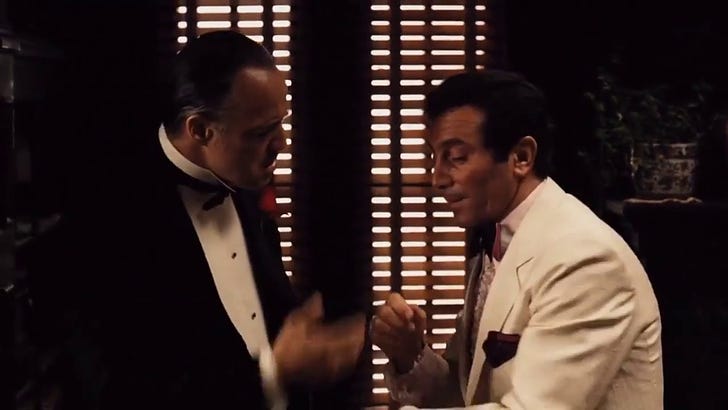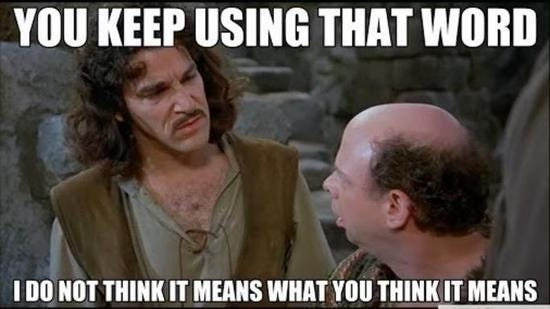(Ed. Note: Best Classical of 2024 was previously promised for December 13, but our writer was preoccupied with this topic and insisted this be published first. Best Classical list will be published December 17, for Beethoven’s birthday. Thanks for your patience.)
What it would be like if I got to interview Peter Gelb
When Johnny Fontane Comes Calling …
I see a lot of operas in New York City, easily a dozen each calendar year at the Metropolitan Opera and several more from organizations like On Site Opera and Experiments in Opera and the annual Prototype Festival (I’ll be at that again in January). Through what is now several decades in NYC and San Francisco (where I studied with an opera composer and began what is still a failure of a score) at the opera there; and New York City Opera before it essentially disappeared and Gotham Chamber Opera before David Bennett’s mismanagement (which included using restricted gifts for operating expenses, one of which obviously was his own salary and benefits) destroyed it; spectacular and imaginative productions from visiting companies, such as Les Arts Florissants’ Atys and tiny, limited events like an extraordinary zero-budget Akhnaten at the Oakland Opera Theater and outdoor productions by Vertical Player Repertory, I’ve accumulated a substantial amount of experience.
In a way, that puts me into opera culture, the world of people who are fans of individual singers, who applaud the crowd scene in Zeffirelli’s La Bohème at the Met, who think everything Yannick Nézet-Séguin does is gold-plated, and who, in one memorable moment, watch their own recordings on their phones of Anna Nebtreko singing while she’s live on stage in front of them at the fucking Met Opera house. And while my experience means I have the memory of production histories, of certain performers in different roles, or even specific performances by a singer in one role across several seasons, I am in no way part of opera culture, which is almost entirely about social cachet and prestige and very little, if at all, about the scores, the dramas, the musicality. I’m not a fan, I’m a critic, and I’m a critic because I love the possibilities of operatic form.
Here’s where I use this flimsy excuse to drop in this extraordinary scene from Atys, one of the greatest opera productions ever created and one of the greatest things I’ve ever seen, to show what is possible:
To Peter Gelb, General Manager of the Metropolitan Opera (which as a nonprofit pays him more than $1.3 million a year), that makes me the enemy. As the civic minded-minded NY Times op-ed page, always eager to offer valuable print space to neglected voices, boosted recently, Gelb is disdainful of how critics react to new operas: “Critics, not surprisingly, are not always enthusiastic. Reviews of new, unfamiliar work can be mixed, negative or at times dismissive.”
His specific context is this fall’s productions of Grounded and Ainadamar, the first a Met commission, the second twenty years old. More granular, it’s Grounded, an opera from Jeanine Tesori that Gelb slated and promoted as the grand season opener. It did not receive rapturous response outside of opera culture people (who gave it an expected standing ovation opening night), and Gelb is upfront about thinking our problem with it was that it’s new. Well, actually, the problem is that Grounded is not a good opera.
That New Car Smell
I know that Gelb would never talk to me because I will never write for the Times, but if he would, I’d first ask him what he considers to be new. There are things that are newly made—you can buy a 2025 model year Toyota Tundra, the latest version of a 25 year old vehicle—and there are things that add new ideas to, and extend the possibilities of, operatic form. The Met does plenty of the former, and I do give them credit for slowly updating older operas with new productions, even if those don’t always work out. The Met does absolutely none of the latter.
No fault to them on that, the Met’s purpose, as seen in its gigantic, grandiose size and architecture, is to preserve the central opera tradition, which in practice means operas based on the chassis of Verdi. The Met has produced Philip Glass’ Satyagraha and Akhnaten, which are true masterpieces that belong in the central repertoire, but will never produce Einstein on the Beach which challenges the core dramatic opera form. And something along the line of Robert Ashley’s operas, Paul Pinto’s Thomas Paine in Violence, the experimental language of Joe Diebes? Never going to happen, and that’s fine, the Met is not the place for experimentation.
But along with new being a new version of an old thing, a contemporary example of an ancient human story, comes the commonplace risk of new being an inferior version of something old. And that is Grounded. The problems with it are structural and dramatic: the score is poorly organized and developed for an opera (it’s cursory in the manner of a musical) and the drama neglects everything that makes the Verdian model work. In his op-ed, Gelb presents himself as an expert opera-knower, but what he writes shows that he doesn’t know any more about opera than the average opera culture vulture i.e., not much.
On a historical scale, he bemoans how opera has nowhere near the popularity and importance it did in 1910, and says the responsibility is “a severe lack of music education in our schools and competition from an ever-expanding array of streaming entertainment options.” The lack of music education is a thing, but it has nothing to do with opera’s popularity. The latter is true in that since 1910 film and then TV have taken over the role opera used to play in society as grand entertainment. And one of the problems opera faces is that opera administrators and composers have been unable to rethink the form in terms of new narrative possibilities. It’s the makers, not the audience.
Thanatos, And Eros
Grounded has a problem with death. Death is a consistent feature of operatic drama since Don Giovanni and it’s a near-essential component since the 19th century. Characters in operas die from illness, revenge, passion, political conflict, etc. This usually has an essential moral component, that death is the find-out of some fuck-around. Even if that morality is repulsive, like Wagner sacrificing virgins or the suicide-porn of Madame Butterfly, opera is built around that.
In Grounded, however, death is what happens to other people who are nameless, faceless, and quite possibly innocent. Instead, the protagonist Jess deals death first via fighter-bomber and then as a drone pilot. She eventually has a crisis, but it’s of the corporate girlboss variety. With this as the core of the drama, Grounded simply cannot succeed, it is morally and thus dramatically empty, and anyone with any thoughts about opera that go deeper than those found in opera culture can see this. That Gelb cannot, or that he can but is so dishonest about it that he will go into print and blame people who have nothing to do with the opera for its artistic failure, damns him and those who pay him so much money.
Same As It Ever Was
What does Gelb’s self-declared crusade for new opera give us this season? Ainadamar for one, which is a great opera with a great staging and a visceral and haunting approach to death in the drama—the opera takes the erotics of death and channels them through modern media which is a fucking vital thing. And in 2025 we’ll be getting Moby-Dick and Antony and Cleopatra which I’m very much looking forward to seeing.
But the entire months of November and January have nothing but Puccini and Verdi on the schedule (with a small handful of nights for something else). Gelb has a hell of a lot of chutzpah to talk about his dedication to new opera and how the critics (who don’t get to make any production plans or decisions) somehow hamper this, and then make that schedule. I would challenge him to program a season without Puccini or Verdi.
In his op-ed, he writes, “After Puccini, opera started slipping from its creative peak. Geniuses like Strauss and Janáček followed in the early decades of the 20th century, but with a few exceptions, the second half of the 20th century produced little truly popular opera; composers turned inward, with experimental, sometimes atonal compositions that didn’t appeal to large audiences.” This is utter nonsense and ignorance. Between 1910, the year Gelb starts with, and a snide and superfluous anecdote about visiting György Ligeti, composers produced these operas:
Stravinsky, The Rake’s Progress
Britten, Peter Grimes; Billy Budd
Berg, Wozzeck; Lulu
Shostakovich, Lady MacBeth of Mtsensk
Barber, Vanessa
Menotti, The Consul; The Medium
Picker, An American Tragedy
Hindemith, Mathis der Maler
Weill, Der Silbersee
And do you know the Met, even with Gelb’s robust commitment to new opera, has never produced Messiaen’s Saint François d'Assise? C’mon man. It would be so easy to do such a season if the commitment truly matched the words. But we all know that will never happen.
The bit of empathy I have for Gelb is that I can understand how his life’s perspective makes this near impossible to see. He was born into a leading establishment family which made a career on the administrative side of classical music possible. His is a traditional mainstream perspective and likely feels every step outside is daring and deserves reward. I see opera as a musician and composer, reading scores, writing vocal music, thinking in terms of zero-budgets, and most of all being a freelance critic making just above the poverty line in wages and sitting in the expensive seats among people in far distant social classes. I’m there because I care, and because I see the value and the waste. So pardon me if I call bullshit, but a critic’s duty is to push places that are important to be their best. And in that way I’m one of the best friends the Met Opera has.





YES.